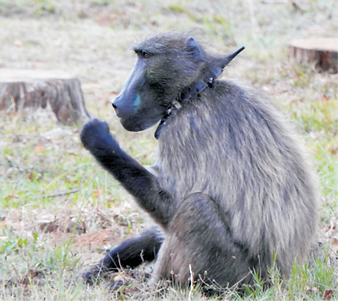
Voices for Animals – A series of interviews with those who speak out loud and clear for all who are born nonhuman

Trade Secret
is a powerful exposé of the polar bear fur trade between Canada and China.
Respected South African environmental journalist Dr Adam Cruise spent six years contributing to the footage in this film. Now it has been premiered at the Climate Film Festival in New York and Dr Cruise shares more of the story with Animal Voice.
Animal Voice:
Welcome home! You and your fellow filmmakers dedicated six years to capturing footage for this exposé. The film reveals the shocking slaughter of polar bears in Canada, with around 800 – 1,000 bear skins exported annually to China at USD 80,000 each. How utterly horrifying, all the more so because polar bears are listed as a vulnerable species by the International Union for Conservation of Nature.
Adam Cruise:
The film uses stark and arresting visuals, such as close-ups of polar bears and auction footage, along with a powerful score, to highlight the tragic contrast between the bears' wild beauty and their exploitation as a commodity. Reviewers so far have describe the film as moving and emotional.
Our documentary is notable for an organic plot twist that uncovers how some of the very organisations and governments entrusted with protecting the species are entangled in its continued commercialisation. This revelation will come as a genuine shock to many viewers.
Critics and audiences agree that Trade Secret is an important and essential film that needs to be seen by a wide audience. It raises critical questions about the nature of conservation and motivates viewers to reconsider how they view the world of wildlife protection.
We won the overall award at the festival for best documentary as well as the Audience Choice Award.
Animal Voice:
Wow! Congratulations! When can we see it?
Adam Cruise:
We are hoping to have this film picked up by the big streamers such as Netflix. We are also thinking of doing an African premiere of the film in Cape Town in November. For now, the trailer can be seen here: https://www.youtube.com/watch?v=Kd1uLSEqgCs
Animal Voice:
In your doctoral thesis, you argue that humanity must breach the “insuperable line” (as coined by the 18th Century philosopher and jurist Jeremy Bentham) that we have drawn to separate ourselves from other animals.
Adam Cruise:
Yes, we must dismantle this yawning chasm – this abyss between ourselves and all other living beings. We must shift away from our parasitic exploitation of animals. This begins by taking a sober look at ourselves. We don’t have the memory of an elephant, the scenting abilities of a dog, or the navigational genius of birds. These are forms of intelligence beyond our own. Humans do indeed have extraordinary capabilities – but uniquely among species, we also have the power to destroy and desecrate.
Animal Voice:
Would you say the “insuperable line” not only separates us from all other animals, but also fundamentally separates those of us who believe animals have intrinsic value and deserve to live free from human harm, and those of us who view animals merely as commodities for exploitation – or as vermin, if deemed useless?
Adam Cruise:
It sure does. Non-human animals should not be valued solely for their benefit to humans or ecosystems but should be acknowledged as beings with their own interests, lives, and capacity for flourishing. Conservation that focuses only on “sustainable use” or “population management” reduces other animals to numbers, disregarding individual welfare. Recognising intrinsic value hifts the ethic to one that respects other animals as ends in themselves. Approaches that justify killing elephants, lions, or rhinos for economic gain (e.g., trophy hunting, ivory trade, culling) fail ethically because they overlook the intrinsic worth of each individual animal. Policies that take intrinsic value seriously would prohibit exploitative practices. Instead policies would favour co-existence, non-lethal management, and respect for animal autonomy.
Animal Voice:
A case in point is the ongoing conflict between baboons and several communities in South Africa’s Western Cape. According to baboon antagonists, the baboons are the intruders and aggressors.

Driven from her habitat
Struck on the face by a paintball
Tormented by an outrageously big collar

Adam Cruise:
The truth is quite the opposite. We have driven baboons from their natural homes and food sources – the equivalent of forced removals, to borrow the language of apartheid.
Even the language we use against non-humans reflects dominance and subjugation.
Think about it…
-
“Stock” or “livestock” – Reduces sentient beings to economic units, implying they exist primarily for human profit.
-
“Game” – Frames wild animals as targets for sport rather than as autonomous creatures.
-
“Pest” – Justifies lethal control of animals deemed inconvenient, erasing moral consideration.
-
“Harvest” – Often used in hunting or culling contexts, implying animals are crops rather than lives.
-
“Problem animal” – Labels creatures in conflict situations (like elephants near farms) as obstacles rather than sentient beings.
-
“Resource” – Positions wildlife as commodities for human use, whether in tourism, meat, or trophies.
-
“Population” (in ecological management) – Focuses on numbers instead of individual welfare, enabling mass culling or sterilisation.
-
“Vermin” – Dehumanises or delegitimises existence, historically used to justify extermination.
These terms shape perception and policy, making ethical transgressions against animals seem normal or necessary. By changing language to emphasize individuality and sentience, humans can cultivate a conservation ethic that respects animals’ intrinsic value.
We are the ones who created this antagonism because we want to take more and more – and more – of the environment for ourselves.
Animal Voice:
In her compelling book The Lion’s Historian, Stellenbosch University historian Professor Sandra Swart argues that human history is incomplete without acknowledging the role of non-humans. She reminds us that our shared history with baboons includes eons of good neighbourliness. For example, they guided us to edible roots and tubers; they were our sentinels. Only with the advent of farming, and the easy pickings it provided, did this neighbourliness sour. She suggests our prevailing attitudes toward baboons would likely shift overnight if they were suddenly discovered to hold a secret vital to human survival.
What are your thoughts?
Adam Cruise:
As Professor Swart notes, if we are ever to bridge this “insuperable line,” we must “fathom the dark ecology of the human heart” and recognise that animals are profoundly sentient beings with cultures of their own, just like ourselves.
Animal Voice:
At the Climate Film Festival, was there any sense of progress – any softening of the “dark ecology of the human heart” toward the wild non-humans who share this journey of life with us?
Adam Cruise:
Almost every film and every person there believes in recognising the intrinsic values of non-human animals, and champions their full protection amid this burning planet of ours.
Animal Voice:
So do you believe there is hope?
Adam Cruise:
Yes, I do. Consider the global ban on the ivory trade…
-
In recent years, I was part of several groups and individuals that successfully lobbied several countries to strengthen domestic ivory bans to curb poaching and illegal trade. The UK’s Ivory Act 2018 (enforced in 2022) prohibits almost all ivory sales, while China ended its domestic ivory market in 2017. Hong Kong followed in 2022, banning commercial trade including pre-1990 ivory. In the US, federal law restricts ivory sales, though some state-level measures, such as New York’s stricter ban, have faced legal challenges. These measures collectively reduced demand and protect elephant populations globally.
-
By documenting the capture methods of baby elephants for export to China, publicising the welfare abuses, and lobbying international regulators, my evidence and articles in National Geographic and The Guardian – of calves being forcibly separated from their mothers and the high mortality rates that followed – l helped galvanise public and political pressure. Ultimately all of the above contributed to CITES restrictions and Zimbabwe’s suspension of live elephant exports, effectively halting the trade.
These victories prove that sustained pressure works. Momentum is building, and the pressure must continue.
Animal Voice:
We thank you.

Trophy Hunting in the Cross Hairs

In 2023, the United Nations elevated animal rights into the human rights domain for the first time in history.
General Comment No. 26: Article 35 provides authoritative guidance whereby all 196 member states must align their laws, policies, and practices with the legally binding UN Convention on the Rights of the Child. Included in the Rights of the Child is the explicit obligation to protect children from all forms of physical and psychological violence – including exposure to domestic violence and cruelty to animals. Practices such as trophy hunting are now under direct scrutiny.
This landmark decision ensures that countless children will no longer be socialised into believing violence is “normal,” and instead will grow up learning that compassion and empathy for all living beings must be preserved.
Video link here: https://www.youtube.com/watch?v=B2pdSKv8k8k
NB: Animal Voice has drawn Minister of the Environment Dr Dion George’s attention to GC26:35.
Here, Dr Adam Cruise gives his eyewitness account of a trophy hunt in Northern KwaZulu Natal:
“A child was present – about 16 years old. His father proudly explained that his son had been shooting animals since he was three.
This is how it unfolded… It wasn’t about tracking or stalking. Instead, the Austrian tourist and his son booked into a 5-star lodge overnight. The next morning, after breakfast, dressed in safari gear (and ironically wearing Crocs), they joined others on a safari vehicle, guns fitted with silencers and telescopes.
“Suddenly, the tourist spotted his prize: a magnificent antelope with massive horns, browsing peacefully. He signalled for the vehicle to stop. He stubbed out his cigarette, took aim, and fired. The shot wasn’t clean. The buck fled, leaving a trail of blood.
“Trackers followed and returned 20 minutes later, dragging the dead animal back, blood seeping out from its mouth and nose. They wiped the blood off its face, then propped its head on a mound of sand, and staged photographs. For me, it was a grotesque celebration of murder.”
“GC26:35 is a monumental step forward in the UN’s Child Rights framework. Recreational hunters are now firmly in the spotlight for a complete ban.”

Footnote
Adam Cruise’s doctoral thesis, “Delinearizing the insuperable line: deconstruction as an animal ethic”, calls for a fundamental transformation in how humans perceive and relate to the natural world – shifting from parasitic exploitation to genuine symbiosis.



